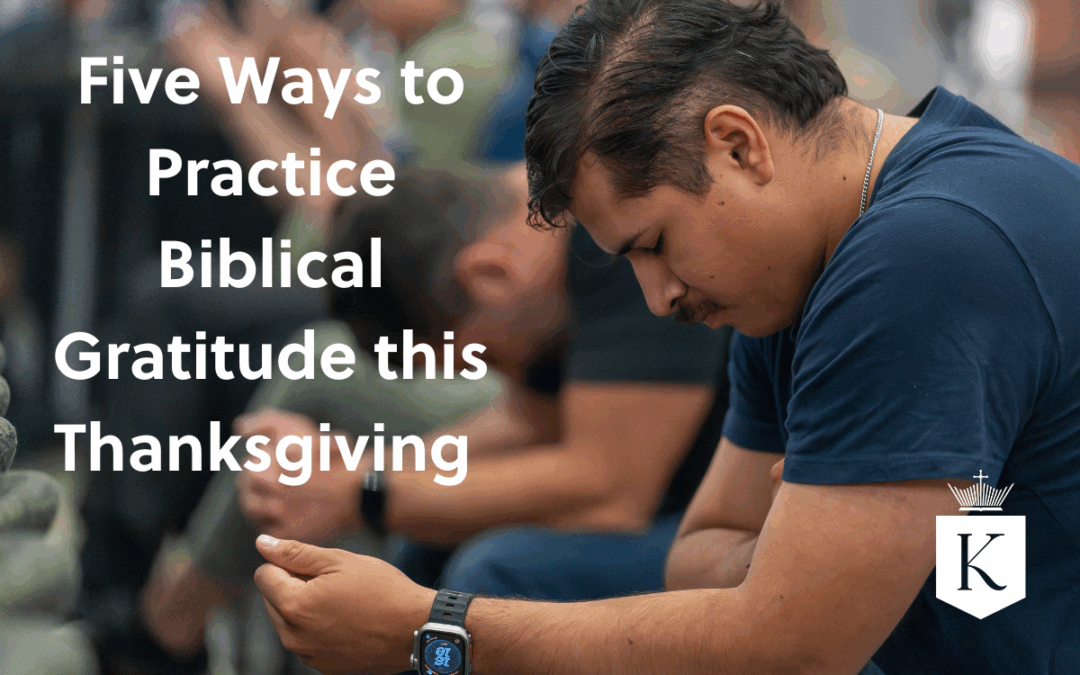Thanksgiving is a time when traditionally people gather with family and friends to feast and reflect on the many blessings they have received. Although maybe you grew up in a home where Thanksgiving wasn’t about the blessings but more about gathering around the TV to watch the Cowboys give us something else to pray about. Or maybe it was about planning your Mission: Impossible-style route for Black Friday deals. Perhaps Thanksgiving had less to do with gratitude and more to do with which relatives would argue over politics, the past or both.
If that sounds more familiar to you than a season of gratitude and reflection – consider this an invitation to shift your perspective – let this be a guide through the season and life. Christian Gratitude isn’t a season virtue – it’s a biblical mandate. The Bible calls believers to give thanks in all circumstances, not just when the day has been good or our favorite football team has won. Scripture invites us into a lifestyle of gratitude – one that is rooted in our relationship with God, not just our circumstances. Let’s consider 5 intentional ways we can practice biblical gratitude all year long, and not just in this season of thanks.
1. Remember What God Has Done
Psalm 103:2 “Bless the Lord, O my soul, and do not forget all His benefits.”
Biblical gratitude starts with remembering. In the Old Testament God regularly called His people to remember His faithfulness. All through the wilderness the Lord reminds the Israelites to not forget all that He did to rescue them from Egypt. The Passover meal itself is a purposeful meal to remember the bitterness and the tears of their ancestors as well as the faithfulness of God. When the Israelites finally made it to the Promised Land, God told Joshua to set up stones of remembrance (Joshua 4:6-7, 21-24) so future generations can see and remember God’s faithfulness.
Take some time and reflect all the times God has been faithful to you. Write down five specific ways God has shown up for you in your life this year. When we remember God’s faithfulness, we re-anchor our hearts to the faithfulness of God.
2. Give Thanks in ALL Circumstances
1 Thessalonians 5:18 “Give thanks in all circumstances; for this is the will of God in Christ Jesus for you.”
This can be a challenging scripture to hold to. It is difficult to be thankful in a season where maybe you’ve lost your job, or a loved one, or even have had health issues. It is in these moments where gratitude can help more than you think. In The Journal of Psychology and Christianity, Jeff C. Huffman from Harvard Medical School conducted research on the effects of gratitude on patients with heart disease, and he found that gratitude – along with increased physical activity – may positively influence recovery after long-term health behaviors in cardiac patients.1 Having an attitude of Biblical thankfulness in all circumstances helps your heart to recover and be healthy. Thanksgiving is not the denial of difficulty – it’s the declaration of trust.
3. Speak Gratitude Out Loud
Psalm 107:1-2 “Give thanks to the Lord, for he is good, for his steadfast love endures forever. Let the redeemed of the Lord say so…”
Gratitude grows when it’s spoken. Sharing your testimony of God’s provision not only encourages those around you, but it also reminds you of what God has already done, and how He will not abandon you. Take some time to share your story with someone this season and listen to their story as well. When we speak out our thankfulness, we shift the atmosphere. You never know how your words might be the encouragement someone else needs – or how their story might reignite your own faith.
4. Serve Others as a Response to God’s Goodness
Hebrews 13:16 “Do not neglect to do good and to share what you have, for such sacrifices are pleasing to God.”
Gratitude isn’t just vertical to God; it is also horizontal to others. When we are truly thankful, we look for ways to show our thanks through giving of our time, energy and possibly finances to those who need encouragement. A practical way to do this during this season is to volunteer. Food banks and homeless shelters can be full of volunteers at this time, think about other places like nursing homes or hospitals. Visit a widow who might be lonely during this season. Adopt a single-parent family who may need extra support during this season, as school breaks and holiday expenses can created additional financial strain. Let your gratitude be an action that becomes the hands and feet of Christ. Gratitude that moves outward becomes more than a feeling – it becomes a witness. Don’t limit it to a season; let it becomes a lifestyle that reflects the heart of Christ all year long.
5. Cultivate Daily Habits of Thanksgiving
Colossians 3:17 “And whatever you do, in word or deed, do everything in the name of the Lord Jesus, giving thanks to God the Father through him.”
Remember that gratitude is not just for November, it is for everyday! Think of gratitude as a muscle that needs regular work outs. For some, gratitude is easy, for others of us, gratitude does not come naturally. We need to work it out. Start a gratitude journal, make it apart of your daily prayer to God. Thank him for three things every morning. While you drive to work, turn off the radio and take time to cultivate a car ride of thanks. As you notice things along the way that remind you of God’s goodness, thank Him for them. Make it a habit to thank your co-workers – “Thank you for sending that reminder email.” And when you notice something you’re grateful for in a friend or family member, say it – “Thanks for doing the dishes” (even if it was their responsibility). Gratitude expressed builds a thankful heart. The more we give thanks, the more we see God’s hand at work.
Christian gratitude should not be relegated to a month in the calendar. God calls us to live a life full of thanks in all things and all circumstances, be thankful for where you are, what God has given you – and yes, even what has been taken away. Through gratitude you can experience deeper peace, grow in trust and see God’s hand at work – even in the hard places.
.
The King’s University integrates Biblical education and practical ministry to shape Spirit-formed individuals who follow Jesus, serve His Church, and are sent to impact the world. To learn more about The King’s University or to request more info, please visit our website.


